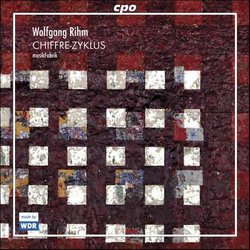| All Artists: Wolfgang Rihm, Stefan Asbury, musikFabrik Title: Wolfgang Rihm: Chiffre-Zyklus Members Wishing: 1 Total Copies: 0 Label: Cpo Records Release Date: 6/20/2006 Genres: Special Interest, Classical Styles: Chamber Music, Historical Periods, Classical (c.1770-1830), Modern, 20th, & 21st Century Number of Discs: 2 SwapaCD Credits: 2 UPC: 761203716920 |
Search - Wolfgang Rihm, Stefan Asbury, musikFabrik :: Wolfgang Rihm: Chiffre-Zyklus
 | Wolfgang Rihm, Stefan Asbury, musikFabrik Wolfgang Rihm: Chiffre-Zyklus Genres: Special Interest, Classical |
Larger Image |
CD Details |
CD ReviewsChiffre-Zyklus -- The Cipher Cycle R. Hutchinson | a world ruled by fossil fuels and fossil minds | 06/23/2007 (5 out of 5 stars) "Wolfgang Rihm is one of the best contemporary composers, but his music presents numerous obstacles for his erstwhile listeners. Though his compositional output is vast, little of it has been recorded. I didn't immediately take to Rihm, partly because I didn't find his best works first, but this 2-disc set is superb.
The CHIFFRE-ZYKLUS (Cipher Cycle) brings together 10 short works for chamber ensemble, mainly composed between 1982 and 1985, though the last piece was revised in 2004. They form a series, using related materials, and are here presented as a continuous cycle, performed live on March 14, 2004 by the musikFabrik ensemble, conducted by Stefan Asbury. There are clear parallels to the later JAGDEN UND FORMEN, which also represented the "final" stage of development of a series of smaller works, and which is also an engaging work with a headlong forward momentum. CHIFFRE-ZYKLUS has a distinctive galloping rhythm, convulsive, propulsive and relentless, driven by the piano. The musikFabrik ensemble is composed of six strings, four woodwinds, four horns, piano, and two percussionists. Of the ten Ciphers, only three [Chiffre V, Chiffre VII and Nacht-Schrift (eine Chiffre)] feature the entire ensemble. The others are for smaller units of 14, 12, 9 or 8 instruments, with Chiffre I featuring piano and seven instruments, and Chiffre IV for only bass clarinet, cello and piano. Rihm's music in sui generis. He has described CHIFFRE-ZYKLUS as involving "attempts to find a musical language free of prescribed sequential and elaborative procedures. What is involved is the free setting of the individual event, not caused, without consequence in the stricter sense -- the free procreation of an imagination space; the quest for sound objects, for sound signs, a sound writing (quoted in the liner notes by Andreas Gunther). This musical anarchism has no system to ensure any sort of formal "success" through inter-subjective consensus. Of course this is true of the avant-garde in general, but Rihm is an extreme case in his rejection of all trends and forms. A brief note on one of the Ciphers, Bild (eine Chiffre), which was commissioned for use as accompaniment to the 1928 Buis Bunuel/Salvador Dali film "Un chien andalou." Rihm sees his music as free-standing, and in any event could scarcely be program music for a film which is a surrealist series of images with no linear narrative structure. Finally, it seems as though Wolfgang Rihm may be receiving his due outside Germany as some key works are documented. The Hanssler label is leading the way with its Rihm-Edition, which has now released Volumes One, Two, and Three -- see my reviews. I now consider Rihm to be one of THE 12 BEST LATE 20TH/21ST CENTURY COMPOSERS (see my list). And see my WOLFGANG RIHM: A LISTENER'S GUIDE for more recommendations and reviews." |
